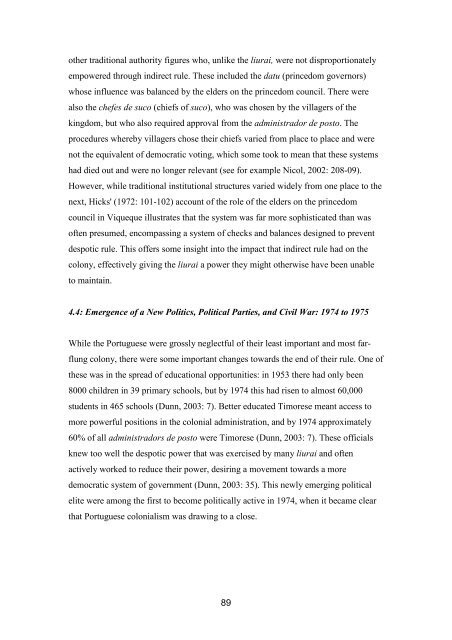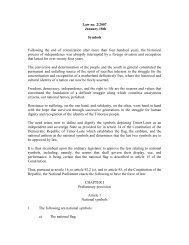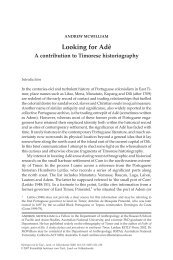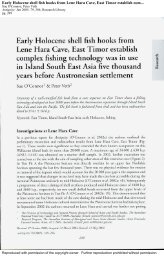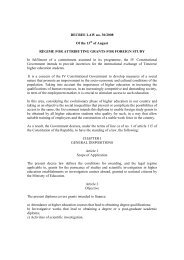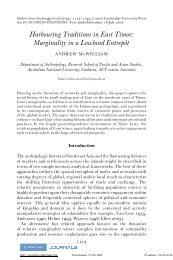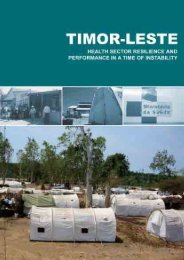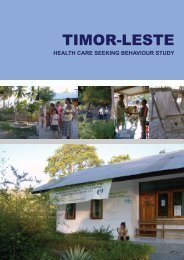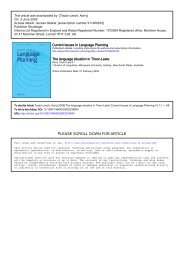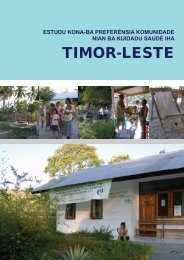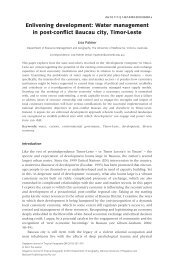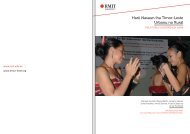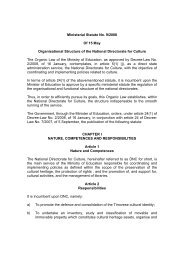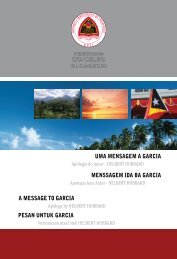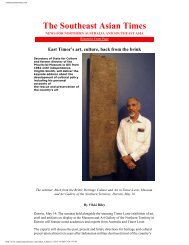Local Governance in Timor-Leste - Secretaria de Estado da Arte e ...
Local Governance in Timor-Leste - Secretaria de Estado da Arte e ...
Local Governance in Timor-Leste - Secretaria de Estado da Arte e ...
- No tags were found...
You also want an ePaper? Increase the reach of your titles
YUMPU automatically turns print PDFs into web optimized ePapers that Google loves.
other traditional authority figures who, unlike the liurai, were not disproportionatelyempowered through <strong>in</strong>direct rule. These <strong>in</strong>clu<strong>de</strong>d the <strong>da</strong>tu (pr<strong>in</strong>cedom governors)whose <strong>in</strong>fluence was balanced by the el<strong>de</strong>rs on the pr<strong>in</strong>cedom council. There werealso the chefes <strong>de</strong> suco (chiefs of suco), who was chosen by the villagers of thek<strong>in</strong>gdom, but who also required approval from the adm<strong>in</strong>istrador <strong>de</strong> posto. Theprocedures whereby villagers chose their chiefs varied from place to place and werenot the equivalent of <strong>de</strong>mocratic vot<strong>in</strong>g, which some took to mean that these systemshad died out and were no longer relevant (see for example Nicol, 2002: 208-09).However, while traditional <strong>in</strong>stitutional structures varied wi<strong>de</strong>ly from one place to thenext, Hicks' (1972: 101-102) account of the role of the el<strong>de</strong>rs on the pr<strong>in</strong>cedomcouncil <strong>in</strong> Viqueque illustrates that the system was far more sophisticated than wasoften presumed, encompass<strong>in</strong>g a system of checks and balances <strong>de</strong>signed to prevent<strong>de</strong>spotic rule. This offers some <strong>in</strong>sight <strong>in</strong>to the impact that <strong>in</strong>direct rule had on thecolony, effectively giv<strong>in</strong>g the liurai a power they might otherwise have been unableto ma<strong>in</strong>ta<strong>in</strong>.4.4: Emergence of a New Politics, Political Parties, and Civil War: 1974 to 1975While the Portuguese were grossly neglectful of their least important and most farflungcolony, there were some important changes towards the end of their rule. One ofthese was <strong>in</strong> the spread of educational opportunities: <strong>in</strong> 1953 there had only been8000 children <strong>in</strong> 39 primary schools, but by 1974 this had risen to almost 60,000stu<strong>de</strong>nts <strong>in</strong> 465 schools (Dunn, 2003: 7). Better educated <strong>Timor</strong>ese meant access tomore powerful positions <strong>in</strong> the colonial adm<strong>in</strong>istration, and by 1974 approximately60% of all adm<strong>in</strong>istradors <strong>de</strong> posto were <strong>Timor</strong>ese (Dunn, 2003: 7). These officialsknew too well the <strong>de</strong>spotic power that was exercised by many liurai and oftenactively worked to reduce their power, <strong>de</strong>sir<strong>in</strong>g a movement towards a more<strong>de</strong>mocratic system of government (Dunn, 2003: 35). This newly emerg<strong>in</strong>g politicalelite were among the first to become politically active <strong>in</strong> 1974, when it became clearthat Portuguese colonialism was draw<strong>in</strong>g to a close.89


